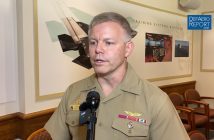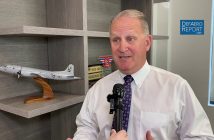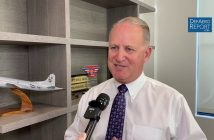Sen. Christopher Coons, D-Del., discusses 2019 spending priorities, strength of the NATO alliance, the gap between President Trump’s rhetoric and policies, Sen. John McCain, and short- and long-term budget outlooks at the Halifax International Security Forum in Nova Scotia, Canada. Our coverage at this 10th annual forum is sponsored by L3 Technologies and Leonardo DRS.
Senator Chris Coons
Halifax International Security Forum
November 2018
Vago Muradian: Welcome to the Defense and Aerospace Report. I’m Vago Muradian here at the Halifax International Security Forum in Nova Scotia, Canada, one of the leading gatherings of military, diplomatic, political, economic and civil society leaders from around the world. Our coverage here is sponsored by L3 Technologies and Leonardo DRS, and we’re honored to have with us Senator Chris Coons, a Democrat from the great state of Delaware. You and I spoke soon after you were elected to office here at the Forum, and it was right after the election of Donald Trump as President of the United States. There was a tremendous bipartisan show of support by lawmakers yesterday. We even have several House members here. Mike Turner from Ohio, obviously. Mike Gallagher also.
Why is it so important for the congressional delegation to be so large? Because there were even other Members who were going to be here but couldn’t make it because of weather, for example.
Senator Chris Coons: I think it was important that we had six United States Senators — Republicans and Democrats — come to the Halifax International Security Forum this year to show that we continue to value and engage with our closest allies.
Canada is a country with whom we’ve had a remarkably important strategic alliance, but also a partnership based on shared values, and we had an opportunity as a delegation to meet with other leaders from Germany to Kosovo, from dozens of countries around the North Atlantic community and the opportunity to participate in substantive policy forums to discuss the challenges facing all of us as democracies and as allies.
Mr. Muradian: What are some of your key takeaways from this conference? Because you were both a participant, but at dinners and also meeting with the NATO Parliamentarians that are here, and I want to ask you a little bit about that.
But what are some of the key takeaways and messages you’re taking as you go into the next year, one in which the Democrats will control the lower House?
Senator Coons: That it’s important for us to send a united message on behalf of the Congress of the United States to our key NATO allies. They have questions and concerns about the strength and durability of our commitment to their security. Based really not on our actions but based on some recent political development.
So there is real value in our reinforcing things that based on our actions, based on our treaty commitments our allies have come to trust and rely on, have built their security architecture around. But given some of the recent political winds both in Europe and in the United States, there is real value in reinforcing our commitment to our collective security obligations.
Mr. Muradian: There was a little bit of debate and discussion during this forum about whether or not the administration, you know, this notion that the President’s rhetoric can be separated from the policies and the progress that the administration is making on many fronts. There are those who say Defense Minister Harjit Sajjan said hey look in some respects the relationship is moving more quickly. So there are some in the audience, particularly on the Republican side that said look, that’s evidence that everything is going good. Whereas others you talk to in private say actually there are a lot of strains in all of our relationships.
How do you see this, given that you’ve had interactions with all of these leaders at every level?
Senator Coons: We just completed in Trident Juncture one of the largest NATO exercises in decades. Twenty-nine NATO countries, a number of partner countries in Northern Europe, 50,000 troops, dozens and dozens of ships and complex operations. It went extremely well.
If you look at that, our engagement, our partnership with our NATO allies particularly in the Baltic Sea is probably stronger, closer than it’s been in a long time. Our investment in forward operating deployment of NATO integrated units going perhaps better than it has in a long time. That’s very encouraging. That was discussed at some length.
General Dunford, the Chairman of the Joint Chiefs was here and gave I think an important address in response to concerns such as this. But we can’t ignore the fact that there are real tensions in our core relationships caused either by tariffs and an ongoing trade war between the United States and China that’s had some collateral harm to our relations with Canada, with European partners, and that there’s other tensions based on our President’s statements about NATO and some of the concerning things he’s said.
We also face real challenges. I was on a panel that talked about China and Russia and the ways in which the ascendancy of China poses a very complex challenge to the current world order, and the ways in which Russia, both interfering in our elections, invading and occupying a piece of Ukraine, and engaging in other destabilizing actions continues to pose a threat to NATO and to Western Europe.
So there’s lots of things in the world that give us reason to need and want to work more closely together, and it’s important for us to not be overly distracted by statements by our President that some might find distracting when compared to our actions.
So as a delegation we kept focusing on things like Trident Juncture, things like our increased investment in security as the actions that underly our ongoing commitments and partnerships.
Mr. Muradian: Are you concerned that the American brand is fraying in part because of the rhetoric of the President as some fear and have expressed fears and concerns here?
Senator Coons: The American brand has to be tended and renewed all the time. That was part of the value of having such a large delegation from the Senate here.
I have heard from Canadian friends that they found the imposition of national security based tariffs on steel exports hurtful, concerning, but we continue to enjoy very close military to military relations, very close nation to nation relations, but at times in any close friendship or partnership, it bears repeating. So I think there is value in our continuing to reassure allies that we value them, that we intend to hold them close, and frankly, many of our allied countries are also having political challenges domestically that cause them to I think better understand some of the things that have led to changes in American politics.
Mr. Muradian: Let me ask you one last question, which is a budget outlook question. There are concerns of a December shutdown. The President wants the wall. Republicans recognize that they have a unitary government now for another month or so, month and a half, almost two months.
Senator Coons: Three weeks of legislative time in Congress.
Mr. Muradian: That’s true. As I was actually, as I was saying that I was like wait a minute, legislative time. Thank you very much, sir. I suspect that a good lawmaker would be tracking the legislative calendar.
How’s the budgetary outlook going to look like? There was a sense that ’20 was going to be the masterpiece budget as Pat Shanahan, the Deputy Defense Secretary had said. You know, there was an expectation that it would trend a little bit outward or go flat. Maybe a little bit of a decline, but actually a little bit true to expectations, it is going to be declining. How do you think that dynamic is going to work?
In going forward there’s this perception that Democrats in the House are going to direct more spending toward, you know, non-defense programs and try to reduce defense expenditures. How is that going to work out? Is that going to damage the bipartisan support that’s existed to be able to give the Pentagon a little bit more resources?
Senator Coons: We’ve had a two-year budget agreement that set the caps at a level that allowed us to increase significantly our spending on both defense and non-defense domestic requirements. So the absence of a budget agreement for the next two years makes for some uncertainty. A divided government where you’ve got one House controlled by the Democrats and one House controlled by the Republicans has historically led to successful bipartisan compromise. That’s why the American people tend to prefer a divided government.
Frankly, this one’s going to be up to the President. Does he insist on funding for his border wall project rather than investment in border security? We haven’t yet gotten in the Senate the detailed proposal that we have expected from Homeland Security that would explain to us how this investment would actually improve our border security. Many of us who are Democrats have voted for robust increased investment in border security, but frankly, doing it with a concrete wall from sea to shining sea is not a very efficient way to do it.
We have new technologies that would allow us to remotely monitor the entire border to establish border security and confidence that our border is not routinely being crossed, and I think you’d see Democratic support for investment in border security that isn’t investment in building a wall for a thousand more miles.
Mr. Muradian: But that would be connected for many Democrats for more meaningful, comprehensive immigration reform.
Senator Coons: Correct. Many of us cosponsored a bipartisan bill that would have put $25 billion into border security in exchange for resolving the now longstanding issue of the Dreamers, those who were brought to the United States as children through no fault of their own and who have contributed to American society, have demonstrated they can stay here and participate.
So that was a deal that was rejected by the President, and in the months since there’s been sort of an impasse. I’ve continued to negotiate on that specific issue with two Republican friends. We’re trying to clear some of the underbrush to re-present some kind of a resolution on this. We’ve got three weeks to get that done before this calendar year ends.
As an appropriator, I’ll tell you this is likely to be a real impasse where the President has to make a simple choice.
What gives me optimism that we may yet get a final budget deal is that Mitch McConnell has been an appropriator for most of his career in Congress and values deeply the idea that we could actually finish an appropriations process. We have made more progress earlier and gone farther on appropriations in this Congress than any of the last eight years in which I’ve served as a Senator.
Mr. Muradian: And let me ask you one last question which is about Senator McCain. Mrs. McCain was here for the awarding of the first McCain Award, and Lesbos received that award for its role in receiving immigrants, the refugees, actually, who have poured upon that poor island’s shores.
Has Senator McCain’s passing reinvigorated? Is that why we’re seeing a bigger congressional delegation, more activity, Members of Congress being a little bit more vocal about America’s values? Because there wasn’t a dry eye in the room when that video played. Everybody has talked about the shadow that Senator McCain, and his presence is almost still here in the conversations. I haven’t had a single conversation where Senator McCain hasn’t come up in it.
Talk to us a little bit about Senator McCain’s legacy. You worked with him closely and knew him well. And how that has affected Members and how they talk about America’s place and role in the world.
Senator Coons: That’s certainly a large part of why I came. The last time I was here it was with Senator McCain. He was leading our delegation. He challenged and inspired me to focus more on human rights.
I am the co-chair of the Human Rights Caucus with Senator Tillis in the Senate. Senator Tillis was supposed to be here but had a family emergency.
And I think many of us feel the vacuum, the absence of his vibrant, vital and strong leadership on making human rights a core piece of America’s foreign policy, leading with our values. The recent tragic case of Jamal Khashoggi, an American resident journalist who was kidnapped and murdered by the Saudis, highlights the point that we can’t simply look at our interests and our defense sales without also looking at to whom we’re selling and why, and whether or not we have a partnership rooted in values.
So I think that is the kind of issue that Senator McCain would have been very vocal on, would have really led on, and many of us in the Senate feel his absence and hope to contribute in some small way to continuing that.
It was wonderful to be here with Cindy McCain, to be able to join with her last night at dinner for some conversation, and then to watch both the video you referenced and the first award of the John McCain Award.
Mr. Muradian: One last question about Khashoggi. Tim Kaine, obviously Khashoggi was a Virginia resident and his children are actually citizens, some of them are. And Senator Kaine said look, there will be repercussions and reconsideration of the U.S. relationship with Saudi Arabia. I know that there are supporters of Saudi Arabia who don’t want to see that and say look, you have to keep the bigger strategic picture in mind, but do you think that we’ve crossed the Rubicon in terms of Washington’s relationship with Riyadh?
Senator Coons: I think there will be a significant reexamination of the relationship. The number of Senators joining a bill that’s been filed will show, I think, broad bipartisan support for a reexamination.
Saudi Arabia has been a vital ally of the United States for decades, is critical to our Middle East security architecture. But they’ve also brought us into a number of very complex, difficult, and morally challenging situations.
The ongoing conduct of the war in Yemen had already strained the support many of us had for the Kingdom. My hunch is that this instance will lead to a very broad reexamination of that relationship.
Mr. Muradian: Senator Chris Coons, Democrat from the great state of Delaware, sir, thanks very much. It’s always a pleasure.
Senator Coons: Thank you. Good to be with you.
30




